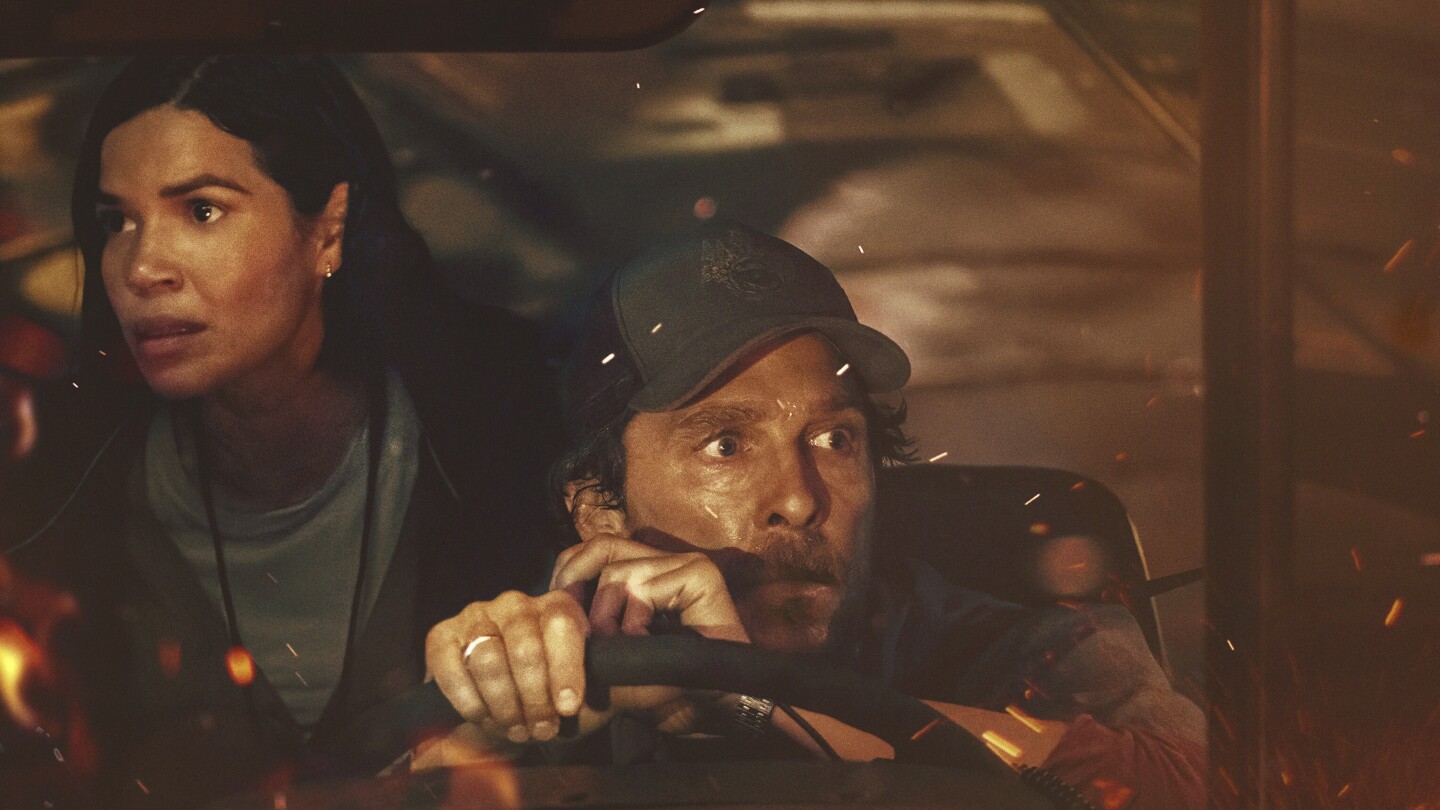In Paul Greengrass’s ‘The Lost Bus,’ Matthew McConaughey portrays Kevin, a bus driver thrust into an unimaginable situation. Set against the backdrop of the devastating 2018 Camp Fire in Paradise, California, the film dramatizes the harrowing five-hour ordeal of transporting 22 elementary school students to safety. This white-knuckle wildfire drama explores themes of heroism, regret, and the resilience of ordinary people in the face of extraordinary disaster.
Adapted from Lizzie Johnson’s novel ‘Paradise: One Town’s Struggle to Survive an American Wildfire,’ ‘The Lost Bus’ navigates the delicate balance between real-life tragedy and cinematic entertainment. With a deft touch, Greengrass creates a captivating and moving disaster movie that is both frightening and inspiring. FYM News dives into the heart of this film, examining its performances, direction, and its ability to resonate with audiences.
Matthew McConaughey as Kevin: A Reluctant Hero
Matthew McConaughey delivers a compelling performance as Kevin, a bus driver already grappling with a series of personal challenges. From his dog’s terminal illness to financial struggles and caring for his elderly mother, Kevin’s day takes a dramatic turn when he’s tasked with evacuating 22 children. McConaughey masterfully portrays Kevin’s initial reluctance, annoyance, and eventual transformation into an unlikely hero.
Greengrass avoids painting Kevin as a typical superhero, instead presenting him as an ordinary man who rises to the occasion. McConaughey’s portrayal highlights Kevin’s flaws and vulnerabilities, making his heroic actions all the more relatable and inspiring. This nuanced performance adds depth to the film, exploring themes of duty and unexpected courage.
‘He’s simply a down-on-his-luck guy who showed up and, ultimately, did something extraordinary.’
A Harrowing Journey Through Fire
The film vividly depicts the chaos and destruction of the Camp Fire, creating a sustained sense of dread. As Kevin navigates the school bus through the inferno, the audience is immersed in a white-knuckle experience filled with collapsing power cables and encroaching flames. Greengrass expertly balances the spectacle of the disaster with the emotional journey of the characters.
America Ferrera, as teacher Mary, provides a grounding presence amidst the chaos. Her role is to manage the children, and she portrays that with a mix of fear and resolve. The dynamic between Kevin and Mary adds another layer to the story, highlighting the importance of teamwork and leadership in crisis situations.
‘Greengrass sustains a feeling of dread for the duration of the film, a white-knuckle experience that only gets more stressful when the children are added to the equation.’
Absentee Dads and Regret
‘The Lost Bus’ subtly weaves in a theme of absentee fathers and regret. Kevin’s strained relationship with his teenage son, coupled with memories of his late father, adds a layer of emotional complexity to the narrative. This theme extends beyond Kevin, touching on broader questions of familial responsibility and the impact of absence.
The film invites viewers to reflect on the choices we make and the legacies we leave behind. By exploring these themes, ‘The Lost Bus’ transcends the disaster movie genre, becoming a poignant commentary on human relationships and the search for redemption. The focus here is the story of a bad dad that is in Tom Cruise’s War of the Worlds
‘Speed’ or Reality? Spectacle vs. Authenticity
While the film largely succeeds in maintaining a sense of authenticity, there are moments when it veers into spectacle. The intensity of the action sequences sometimes raises questions about how much the events have been exaggerated for audience excitement. However, even these moments of heightened drama contribute to the overall emotional impact of the film.
Despite these occasional forays into spectacle, ‘The Lost Bus’ remains grounded in the real-life experiences of those who survived the Camp Fire. The film serves as a reminder of the power and unpredictability of nature, as well as the importance of community and resilience in the face of disaster.
Beyond Firefighters: A Focus on Ordinary People
Unlike Joseph Kosinski’s ‘Only the Brave,’ which centers on the experiences of firefighters, ‘The Lost Bus’ shifts the focus to ordinary people caught in an extraordinary situation. This perspective allows the film to explore themes of vulnerability, fear, and the will to survive. By highlighting the actions of everyday individuals, ‘The Lost Bus’ celebrates the potential for heroism that exists within us all.
The film’s emotional resonance stems from its ability to connect with audiences on a human level. Viewers are invited to imagine themselves in the characters’ shoes, grappling with impossible choices and fighting for survival. This relatability is what makes ‘The Lost Bus’ such a powerful and moving cinematic experience.
Conclusion: Finding Humanity in Disaster
‘The Lost Bus’ is a powerful and emotionally resonant film that explores the human capacity for heroism in the face of unimaginable disaster. Matthew McConaughey delivers a standout performance as Kevin, an ordinary man who becomes an unlikely hero. Through its gripping narrative and relatable characters, the film reminds us of the importance of community, resilience, and the ability to find hope amidst devastation.
Ultimately, ‘The Lost Bus’ is more than just a disaster movie; it is a testament to the strength of the human spirit. By focusing on the experiences of ordinary people, the film offers a poignant and inspiring reminder that even in the darkest of times, we are capable of extraordinary acts of courage and compassion. FYM News highly recommends this film for its compelling story, strong performances, and its ability to resonate with audiences long after the credits roll.

Leave a Reply